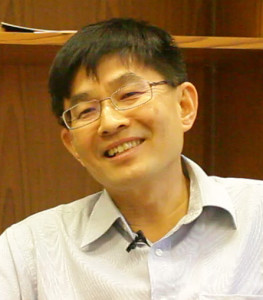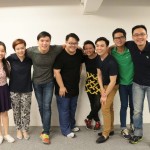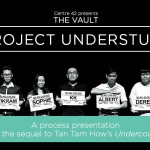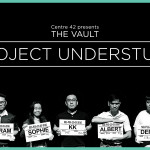Tan Tarn How (1960-) has, at various points in his life, been a teacher, a journalist, a scriptwriter and a research fellow. However, he is best known as one of Singapore’s landmark playwrights with his bold, award-winning works which have certainly pushed boundaries over the years.
The timeline below charts Tan’s life through the plays he penned and some selected milestones. Click on each tab to find out what happened during the year.
This timeline is not meant to be a complete record of Tan’s life — for more information, please consult the additional sources listed below.

Tan Tarn How
(Credit: Singapore Theatre Memories)
- Before 1986
-
Tan Tarn How was born in 1960, and graduated from the University of Cambridge with a Bachelor of Arts in Natural Science Tripos in 1982. He returned to Singapore shortly after, and obtained a Diploma in Education from the National Institute of Education two years later.
- 1986
-
Co-wrote In Praise of the Dentist with his wife Cheam Li Chang, who is a dentist. The play was awarded a Merit prize at the 1986 NUS-Shell Short Play Competition and staged by the Singapore Theatre American Repertory Showcase (ST*ARS) in 1986.
- 1987
-
Joined The Straits Times and held a number of positions over the years, including political reporter, arts deputy editor, and foreign correspondent in Hong Kong and Beijing. Also wrote Two Men, Three Struggles, which once again won a Merit prize at the NUS-Shell Short Play Competition.
- 1989
-
Became a member of the Theatreworks’ Writers’ Laboratory, where he developed his next few plays.
For young and rising playwrights, TheatreWorks has played a significant role in providing a launching plan. This was done via the Writers’ laboratory, launched in 1991 and sponsored by the Singapore Press Holdings, to encourage the writing and production of Singapore plays.
Robin Loon, dramaturge for [the SPH Young Playwrights’ Series III] says: ‘I felt that it provided a good situation for writers to experiment and to write about things.’Source: A launching pad for playwrights. In The Straits Times (17 Feb 1995). - 1990
-
His first full-length play, Home – which is about the residents in an old folks’ home – was staged by Theatreworks.
The other aspects of the drama are derived from the following: one, the discovery of how the characters have come to be in the home (Tang has been placed here by his son, Alex has elected to receive care in the light of his impending demise from illness, and Mrs Goh is widowed but determined to be financially independent for the sake of her daughters); two, the humorous ways in which Alex turns Tang’s rules against him; three, the duo’s knowledge that neither are aware of when their time on earth will run out, and lastly, the nascent friendship that emerges from the tension among the three elderly folk.Source: Six of the Best: Compilation revives veteran playwright's greatest hits by Laremy Lee. In QLRS, Vol. 10(3), (2011), http://tinyurl.com/gp7fytx
In Praise of the Dentist is a deceptive piece of work appearing rather slight at first reading. With careful workshopping, however, it is a theatrical piece capable of being played successfully either as a farce, or as an unsettling depiction of a protagonist on the edge of breakdown.Source: Introduction to NUS-Shell Short Plays Series: Prize Winning Plays. Vol. 1 edited by Max Le Blond. The Department of English Language and Literature, National University of Singapore (1987).
In 1992, when the police’s Public Entertainment Licensing Unit (Pelu) received for vetting Tan Tarn How’s rollicking satirical script about a government agency’s carefully calibrated attempts to inject culture into a nation, they were not particularly amused by its contents.
The script included civil servants breaking into raucous vaudeville acts, a blow-up sex doll, a side-splitting number of committees and subcommittees dealing with bureaucratic minutiae, and a past romantic relationship between a minister of state and a committee chairman, both male.
The script came back from the police – then the body responsible for arts licensing, a task that now falls on the Media Development Authority – with objections to material in 36 of its 67 pagesSource: Classic Singapore Plays: The Lady of Soul And her Ultimate 'S' Machine heralded change by Corrie Tan. In The Straits Times (25 Nov 2014), http://tinyurl.com/gppoej2
- 1992
-
Wrote The Lady of Soul and her Ultimate “S” Machine, a play that revolves around an unnamed nation’s search for soul. When the script was submitted to Public Entertainment Licensing Unit for review, the department came back with many suggested changes. However, when Tan appealed and resubmitted it to the newly-formed Censorship Review Committee, it came back clean. The play was staged by Theatreworks in 1993.
- 1993
-
Attended Boston University on a three-month Fulbright Scholarship.
- 1994
-
His play, Undercover, was staged by Theatreworks. See here for more details.
- 1996
-
His play, Six of the Best, was staged by Theatreworks. It is centred on the controversial caning of American teenager Michael Fay.
Instead of focusing on the issues raised by the press with respect to the incident, Tan Tarn How’s Six of the Best was offered as a play about racism in Singapore. however, for all the play’s efforts to get to the heart of a taboo subject, its real success is in re-inscribing the values of the state with regard to ethnic and cultural difference, a trope repeatedly used by Singapore’s leaders to justify policies of social and state control.Source: Theatre and the Politics of Culture in Contemporary Singapore by William Peterson. Wesleyan University Press (2001).
- 1997
-
Left The Straits Times and joined the Singapore Television Corporation (now known as Mediacorp) as head scriptwriter for the English Drama unit, working on shows such as Growing Up and VR Man.
- 1998
-
His play, The First Emperor’s Last Days, is staged by Theatreworks as part of the Singapore Arts Festival. It revolves around four writers who had to pen the official biography of the first emperor of China.
Although the play’s historical setting was clearly empathized, the use of contemporary props such as notebook computers and video projectors by director Ong Keng Sen introduced a discordant note and focused reference upon the present. Thus the notions of the representation of a nation through the ethnicization of a single man’s life, of disciplinary practices which centre on an individual body – never seen, always present – were repeatedly raised for examination.Source: Putting the Nation Back into the Transnational by Philip Holden. In Reading Chinese Transnationalisms: Society, Literature, Film. Hong Kong University Press (2006).
- 1999
-
Re-joined The Straits Times to hold positions including science and technology editor, political correspondent and deputy news editor.
- 2002
-
His play Machine, about two repairmen who end up fixing more than two single ladies’ washing machine, was staged by Theatreworks. It won Best Script at the Life! Theatre Awards the following year.
Tan’s sensitivity and genius is obvious throughout: The dialogue is light but loaded. In the exchanges, there are just the right doses of surprise to compliment, of feigned ignorance to encourage and of coyness to intrigue, as both the man and woman manoeuvre expertly towards their ultimate goal – the bed, after which the relationship ceases to be.Source: His ultimate Machine? by Suhaila Sulaiman. In The Straits Times (16 Mar 2002).
I was glad to have seen an intellectually impressive and thought-provoking play that refused to take the easy options of cheap emotions or abstract plotting, and succeeded in taking itself seriously, and taking the audience along for the ride.Source: Machine by Theatreworks by Matthew Lyon. In The Flying Inkpot (16 Mar 2002). http://tinyurl.com/js9374t
I pride myself in not being a racist, yet I found myself, and other people who professed they were not racist, reacting to the case in a visceral, sometimes rather unpleasant manner.Source: This man sparks off a play on Six Of The Best by Hsueh Yun. In The Straits Times (19 Apr 1996), http://tinyurl.com/hcj3azk
This play is about the complacency of the average Singaporean, of theatre audiences and practitioners because there is no danger, no real change enacted by our works. It is about the commercialization of theatre; hijacked as entertainment rather than being an engine of change. Can we find a real political theatre, where the audience goes in X and comes out Y? This is the difficulty in writing this kind of work in this day and age, hence the long gap between my last play and this one.Source: Fear of Writing: A commentary on political art and censorship by Jewel Philemon. In The Online Citizen (1 Sept 2011), http://tinyurl.com/jb2yk2c
- 2005
-
Left The Straits Times and joined the Institute of Policy Studies as a senior research fellow, a post that he continues to hold today.
- 2006
-
His play, Confessions of 300 Unmarried Men, was staged by ACTION Theatre.
- 2011
-
Wrote a new play called Fear of Writing, which was once again staged by TheatreWorks. In his words, it is about:
The play received positive reviews, and was selected as one of the “finest plays in 50 years” by The Business Times in 2015:
[Fear of Writing‘s] power lies not just in its share of barbed, probing one-liners, but also in how the language, video images and actors all work together to build a certain argument and create a mood of tension and paranoia.
With it, Tan, a former Straits Times journalist and now researcher at the Institute of Policy Studies, has produced the gravest and most compelling work of his 20-year playwriting career.
Source: A false awakening by Clarissa Oon. In The Straits Times (15 Sept 2011).In the same year, Epigram Books published a collection of six of his plays.
^Back to top
Watch Tan Tarn How and Dr. Robin Loon chat about Tan’s entire playwriting career in the Living Room:
Additional Sources:
- Tan Tarn How Too – About
- Tan Tarn How’s works are available for browsing in the Book Den.
By Daniel Teo
Published on 13 May 2016
The Vault: Project Understudy revisits Tan Tarn How’s Undercover and reimagines its sequel set in 2016 through a collaborative writing creation process. Conceived and edited by Dr Robin Loon and organised by NUS Thespis. Presented on 23 May 2016, 8pm at Centre 42 Black Box. Admission is free. Find out more here.






